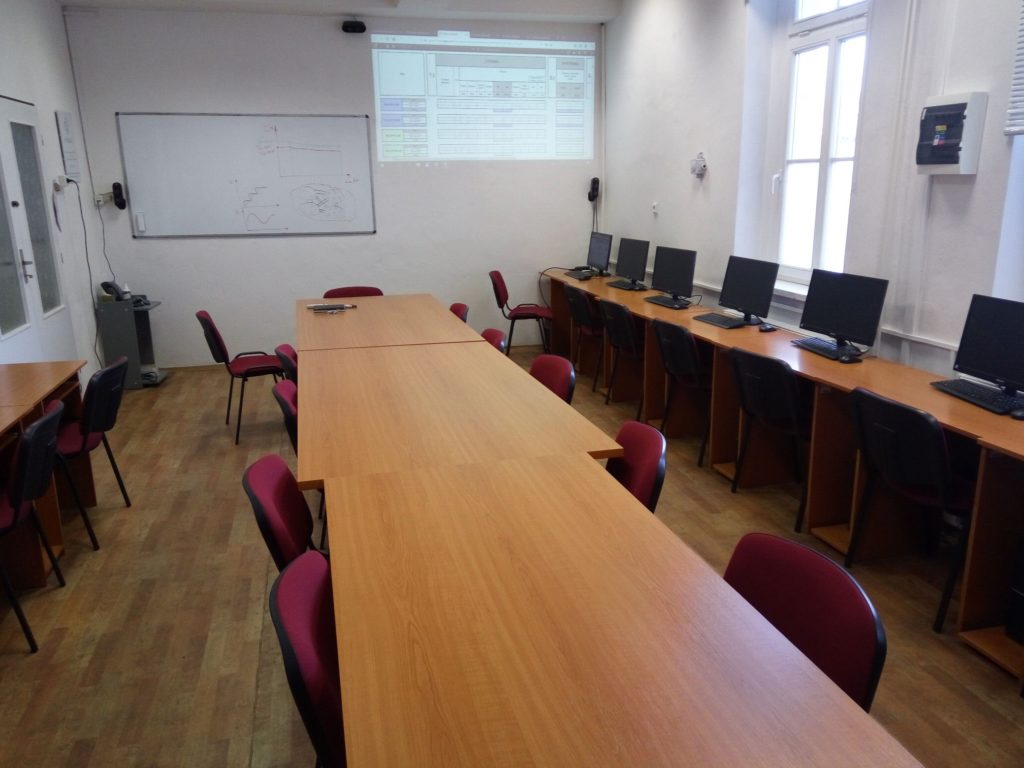
Head of laboratory: doc. Ing. Dušan Medveď, PhD.
Laboratory description:
The Laboratory of Computer Science III was established as a result of the increase in demands, especially for new subjects, for numerical calculations. There are 12 + 1 computers in the given laboratory, which are connected to the Internet. Various subjects are taught here, where demands for higher computing power are placed. The room has a larger number of seats, so it is also used for various seminar and bilateral meetings. Laboratory software: design systems ProgeCAD and gEDA, virtual engineering environment Keysight VEE Pro for collection, analysis and control of measurement, simulation programs EMTP ATP, Matlab, Octave, FEMM for scientific and technical numerical calculations, modeling, algorithm design, computer simulations, analysis and presentation data, measurement and signal processing, design of control and communication systems, EPLAN and Cencros software tools.
Subjects and outputs of education:
- Bachelor study: Subject Measurement in power engineering (basic knowledge of measurement theory and metrology, determination of measurement uncertainties, practical skills in the implementation of measurements in power engineering and processing of measurement documentation)
- Bachelor study: Subject Basics of electrical engineering (Basic knowledge and skills in the field of DC circuit design, creation of technical documentation)
- Bachelor study: Subject Transmission and distribution of electricity (basic knowledge of transmission and distribution of electricity, competence in calculations of parameters of power lines of all voltage levels)
- Bachelor study: Subject Lighting technology (basic knowledge for creating the right lighting environment for various work and leisure activities of people)
- Bachelor study: Subject Fundamentals of design in power engineering (Expanding knowledge in the field of design in power engineering. Competences in the use of software tools progeCAD, EPLAN and Cencros for the preparation of project documentation.)
- Engineering study: Subject Electromagnetic compatibility (basic knowledge and knowledge in the field of EMC technical equipment and biological systems, origin and propagation of electromagnetic interference, elimination of interference on electronic equipment, effects of impulse phenomena in low voltage networks on electronic equipment, principles of PCB design with respect to electromagnetic immunity, shielding and grounding methods for electronic devices).
- Engineering study: Subject Overvoltages in electrical networks (gaining knowledge about the occurrence of surges in electrical networks for different operating conditions, using the correct terminology and symbology, gaining professional skills in using PC technology and software to solve surges arising in operation using the simulation program EMTP ATP)
- Engineering study: Subject Quality and reliability of electricity supply (basic knowledge of electricity quality indicators, based on problem-oriented examples gaining knowledge about the origin and consequences of deteriorating electricity quality and the possibilities of its improvement) The student will also gain knowledge in the field of electricity supply reliability, methods its calculation and the methods of its evaluation.
- Engineering study: Subject Modeling in power engineering (basic knowledge in the field of modeling of power system elements)
- Engineering study: Subject Power system operation management (basic knowledge about new directions of power system management in a liberalized electricity market)


